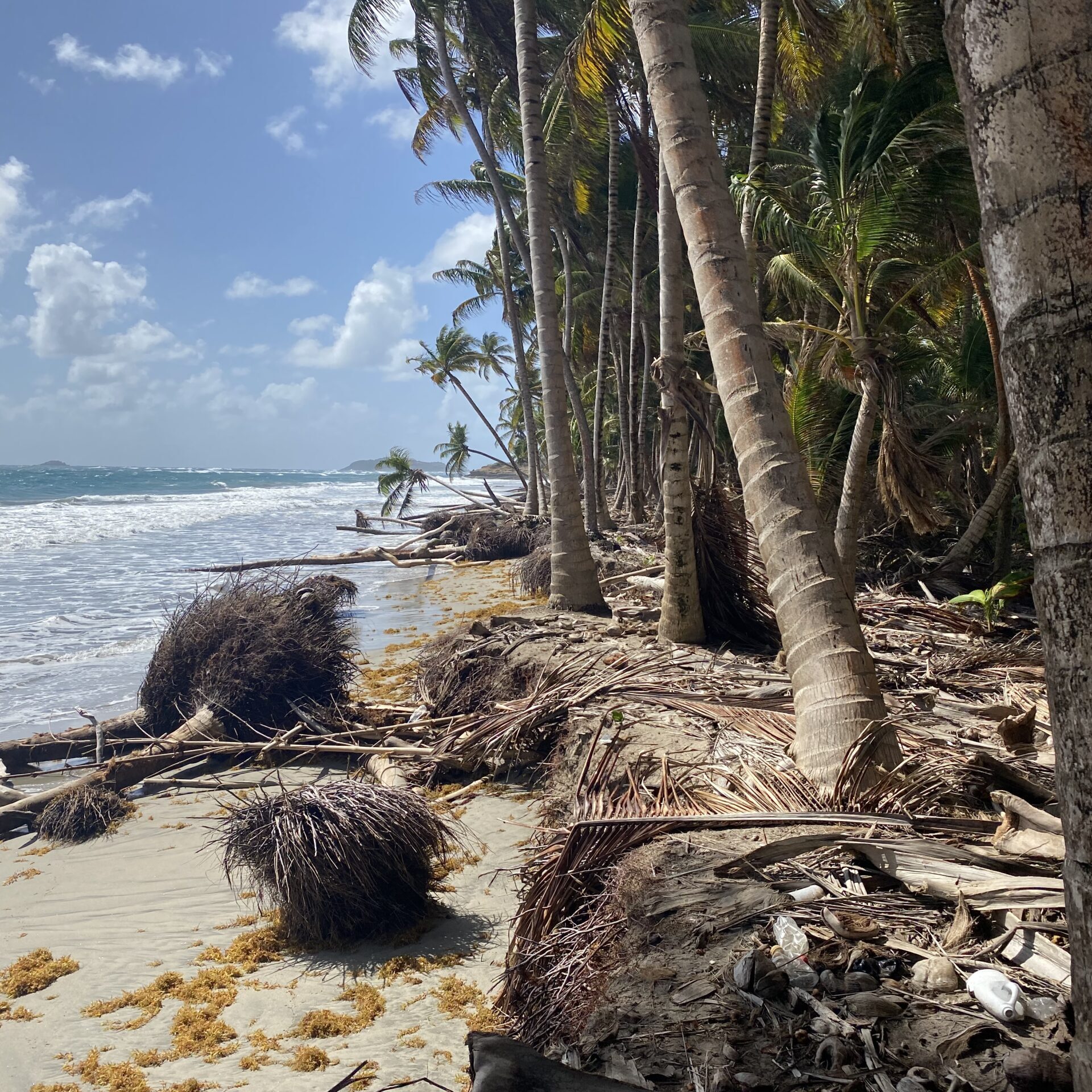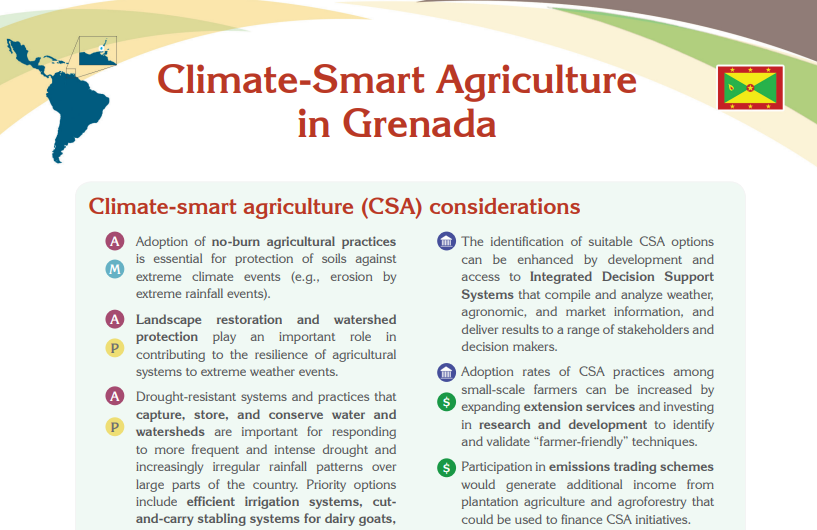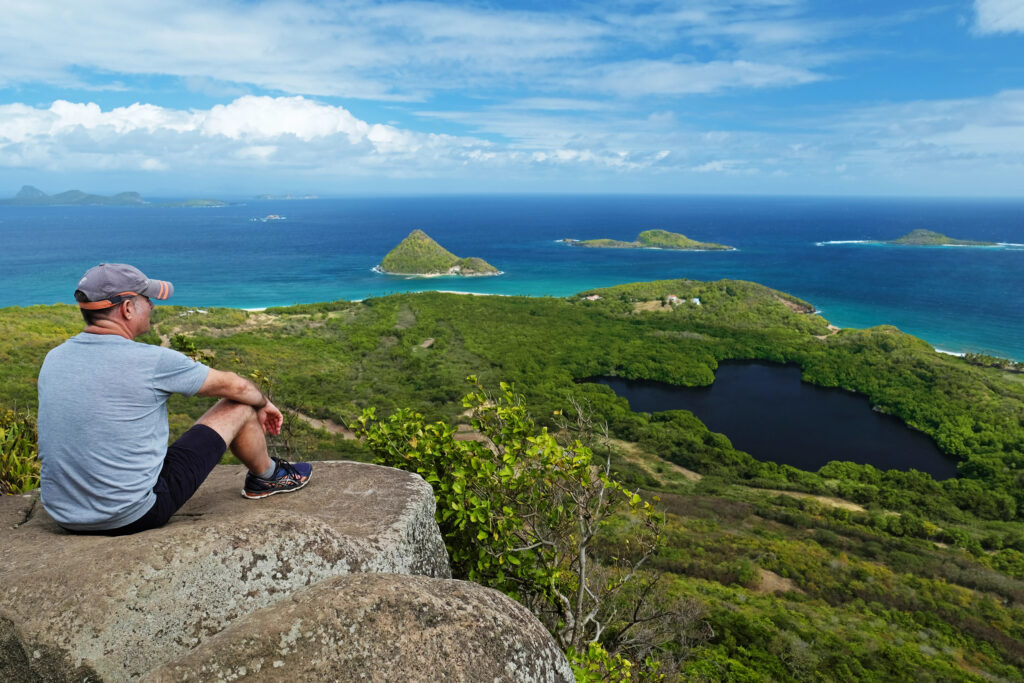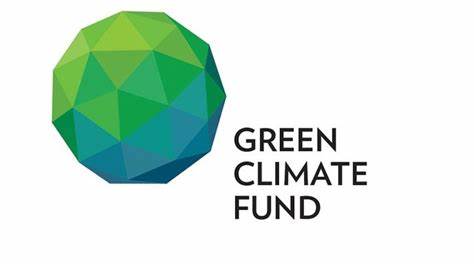
Challenges and Opportunities
Challenges:
- Coastal Erosion and Sea-Level Rise: Rising sea levels pose a direct threat to Grenada’s coastal ecosystems, including beaches, mangroves, and coral reefs, which provide critical habitats for marine life and protect the shoreline from storm surges.
- Coral Reef Degradation: Warmer ocean temperatures lead to coral bleaching and the death of coral reefs, which serve as natural barriers against storms and support marine biodiversity.
- Biodiversity Loss: Climate change has led to habitat degradation, which threatens Grenada’s rich biodiversity, including endemic species of plants and animals.
- Increased Storm Intensity: More frequent and intense storms cause direct damage to forests, watersheds, and coastal ecosystems, undermining their resilience and increasing the risk of landslides and flooding.
- Water Resource Depletion: Prolonged droughts and erratic rainfall affect freshwater ecosystems, reducing the availability of water for both human consumption and wildlife.
Opportunities:
- Ecosystem-Based Adaptation (EbA): Implementing EbA strategies, such as restoring mangroves, reforesting watersheds, and protecting coral reefs, can enhance the resilience of Grenada’s ecosystems while providing benefits such as flood protection and improved water quality.
- Conservation and Protected Areas: Expanding and effectively managing marine and terrestrial protected areas can preserve critical habitats and biodiversity, helping ecosystems adapt to climate change.
- Sustainable Land Management: Promoting sustainable agriculture and reforestation initiatives can restore degraded landscapes and improve ecosystem services, such as soil stabilization and carbon sequestration.
- Ecotourism: Grenada has the potential to further develop ecotourism to support conservation efforts and generate income, while simultaneously raising awareness about the importance of ecosystem resilience.
Sector's Governance
Grenada’s ecosystem resilience is managed by several key governmental and non-governmental institutions. The primary entities involved include:
- Ministry of Climate Resilience, The Environment, and Renewable Energy: This ministry is responsible for developing and implementing policies related to environmental protection, natural resource management, and climate change adaptation.
- Ministry of Economic Development, Planning, Tourism, Creative Economy, Culture, Agriculture and Lands, Forestry, Marine Resources and Cooperatives: This ministry is responsible for the development and implementation or policies that pertains to both land management and marine resources management.
- Forestry and National Parks Department: The department oversees the management of Grenada’s forests, protected areas, and biodiversity conservation efforts.
- Non-Governmental Organizations (NGOs): Environmental NGOs play a vital role in promoting ecosystem conservation and resilience by engaging in reforestation, coral reef restoration, and community-based conservation initiatives.
Policy Framework
Grenada’s ecosystem resilience is shaped by various national policies aimed at addressing climate change impacts and protecting natural resources:
- National Adaptation Plan (NAP): The NAP outlines key strategies for enhancing ecosystem resilience, including reforestation, mangrove restoration, and coral reef protection. It emphasizes the integration of ecosystem-based adaptation into broader climate resilience efforts.
- Grenada National Biodiversity Strategy and Action Plan (NBSAP): This plan focuses on preserving Grenada’s biodiversity through conservation efforts and sustainable use of natural resources, recognizing the role of healthy ecosystems in adapting to climate change.
- Protected Areas and Wildlife Management Act: This act establishes the legal framework for the designation and management of protected areas, ensuring the protection of critical ecosystems and species.
- National Forest Policy (revised 2018): Considering climate change as a key overarching national concern, this document emphasises the need for forest cover for climate mitigation, healthy forests for climate resilience and focused management of forests to facilitate their adaptation to climate change including adaptation to high intensity storms and hurricanes. This policy is supplemented by a strategy for its implementation from 2018 to 2028.
- National Land Policy: This policy promotes sustainable land use practices, particularly in vulnerable areas such as watersheds and coastal zones, to reduce land degradation and improve ecosystem resilience.
- Grenada Climate Change Policy (2017–2021): This policy aims to mainstream climate resilience across all sectors, with specific focus on protecting and restoring ecosystems that provide natural defences against climate impacts.
- Integrated Costal Zones Management Policy: The coastal environment, particularly in the SIDS context, is highly vulnerable to climate change impacts and this policy is tasked to mitigate, adapt to and recover from such impacts.
- Grenada Second Nationally Determined Contributions: the country commitment to reduce its greenhouse gases emission by 40% by 2030 is, in a substantial part, carried through mitigation by preserve existing rain forests and mangrove forests.
Regional and International Agreements
Grenada participates in several regional and international agreements that influence ecosystem resilience and climate adaptation strategies:
- Convention on Biological Diversity (CBD): As a signatory to the CBD, Grenada is committed to protecting biodiversity and ensuring the sustainable use of its natural resources, which is critical for maintaining ecosystem resilience in the face of climate change.
- United Nations Framework Convention on Climate Change (UNFCCC): Grenada is engaged in global climate negotiations and has submitted its Nationally Determined Contributions (NDCs), which include commitments to preserve ecosystems as part of its climate change adaptation and mitigation strategies.
- Caribbean Challenge Initiative (CCI): Grenada is a participant in this regional initiative, which aims to protect 20% of the marine and coastal environments across the Caribbean by 2020. This initiative promotes marine protected areas and supports the conservation of ecosystems critical to climate resilience.
- Organization of Eastern Caribbean States (OECS) Environmental Sustainability Agenda: Grenada works with OECS member states to promote environmental sustainability through policies that strengthen ecosystem resilience and support adaptation to climate change impacts across the region.
- The Green Climate Fund (GCF) and Global Environment Facility (GEF): Grenada receives funding and technical support from these international organizations for projects aimed at restoring ecosystems and building climate resilience through ecosystem-based adaptation strategies.
- Ramsar Convention on Wetlands: A signatory of the convention, Grenada’s first obligatory Ramsar Site is a 512ha site located in Levera, St Patrick’s.
- Escazu Agreement: Also known as the Regional Agreement on Access to Information, Public Participation and Justice in Environmental Matters in Latin America and the Caribbean, it aims to enhance the delivery of environmental justice and thereby support citizen who are concerned about the resilience of their ecosystems.
Ecosystem Resilience in Grenada
Grenada’s ecosystems are facing significant challenges due to climate change, but efforts are underway to build resilience and restore natural systems.
- Coastal Ecosystems: Mangroves, coral reefs, and seagrass beds along Grenada’s coastlines are under threat from sea-level rise and warming ocean temperatures. Coral reefs, in particular, have been affected by bleaching events, and mangrove restoration projects are critical to strengthening the resilience of coastal zones.
- Forests and Watersheds: Grenada’s forests play an essential role in water regulation, soil conservation, and carbon sequestration. However, deforestation and land degradation, coupled with increasing temperatures and changing rainfall patterns, pose risks to the island’s watersheds and biodiversity.
- Marine Protected Areas: Grenada has established several marine protected areas (MPAs) to conserve critical marine ecosystems. These MPAs serve as natural buffers against storms and support biodiversity conservation efforts.
- Ecosystem-Based Adaptation Projects: Grenada is implementing various ecosystem-based adaptation (EbA) projects that focus on restoring degraded ecosystems, including coral reefs and mangroves, as part of its broader climate resilience strategy.
- Community Involvement: Local communities are increasingly involved in conservation efforts, such as reforestation projects and coral restoration activities, contributing to the long-term sustainability of ecosystems and enhancing local capacity to adapt to climate change.





